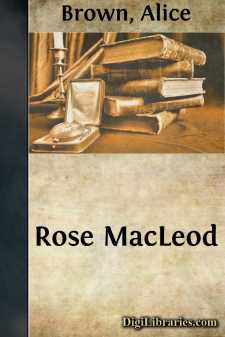Categories
- Antiques & Collectibles 13
- Architecture 36
- Art 48
- Bibles 22
- Biography & Autobiography 813
- Body, Mind & Spirit 142
- Business & Economics 28
- Children's Books 14
- Children's Fiction 11
- Computers 4
- Cooking 94
- Crafts & Hobbies 4
- Drama 346
- Education 46
- Family & Relationships 57
- Fiction 11829
- Games 19
- Gardening 17
- Health & Fitness 34
- History 1377
- House & Home 1
- Humor 147
- Juvenile Fiction 1873
- Juvenile Nonfiction 202
- Language Arts & Disciplines 88
- Law 16
- Literary Collections 686
- Literary Criticism 179
- Mathematics 13
- Medical 41
- Music 40
- Nature 179
- Non-Classifiable 1768
- Performing Arts 7
- Periodicals 1453
- Philosophy 64
- Photography 2
- Poetry 896
- Political Science 203
- Psychology 42
- Reference 154
- Religion 513
- Science 126
- Self-Help 84
- Social Science 81
- Sports & Recreation 34
- Study Aids 3
- Technology & Engineering 59
- Transportation 23
- Travel 463
- True Crime 29
Alice Brown
Alice Brown (1857–1948) was an American novelist, poet, and playwright, renowned for her New England regionalist literature. She wrote numerous novels, short stories, and plays, often depicting rural life and the complexities of human relationships. Among her notable works are the novel "Meadow-Grass" (1895) and the play "Children of Earth" (1915), which highlighted her keen observations and rich character portrayals.
Author's Books:
Sort by:
by:
Alice Brown
DOORYARDS Tiverton has breezy, upland roads, and damp, sweet valleys; but should you tarry there a summer long, you might find it wasteful to take many excursions abroad. For, having once received the freedom of family living, you will own yourself disinclined to get beyond dooryards, those outer courts of domesticity. Homely joys spill over into them, and, when children are afoot, surge and riot...
more...
by:
Alice Brown
There could not have been a more sympathetic moment for coming into the country town—or, more accurately, the inconsiderable city—of Addington than this clear twilight of a spring day. Anne and Lydia French with their stepfather, known in domestic pleasantry as the colonel, had hit upon a perfect combination of time and weather, and now they stood in a dazed silence, dense to the proffers of two...
more...
by:
Alice Brown
The life of Francis Hume began in an old yet very real tragedy. His mother, a lovely young woman, died at the birth of her child: an event of every-day significance, if you judge by tables of mortality and the probabilities of being. She was the wife of a man well-known among honored American names, and her death made more than the usual ripple of nearer pain and wider condolence. To the young husband...
more...
by:
Alice Brown
Madam Fulton and her granddaughter Electra were sitting at the breakfast-table. It was a warm yet inspiriting day in early spring, and, if the feel and look of it were not enough, the garden under the dining-room windows told the season's hour like a floral clock. The earliest blossoms had been pushed onward by the mounting spirit of the year, and now the firstlings of May were budding. The great...
more...
by:
Alice Brown
John Raven sat in the library of his shabby, yet dignified Boston house, waiting for Richard Powell, his nephew, whom he had summoned for an intimate talk. He was sitting by the fire making a pretense of reading the evening paper, but really he was prefiguring the coming interview, dreading it a good deal, and chiefly for the reason that there was an argument to be presented, and for this he was...
more...
by:
Alice Brown
NUMBER FIVE. We who are Tiverton born, though false ambition may have ridden us to market, or the world's voice incited us to kindred clamoring, have a way of shutting our eyes, now and then, to present changes, and seeing things as they were once, as they are still, in a certain sleepy yet altogether individual corner of country life. And especially do we delight in one bit of fine mental...
more...
by:
Alice Brown
THE PLAY HOUSE Amelia Maxwell sat by the front-chamber window of the great house overlooking the road, and her own "story-an'-a-half" farther toward the west. Every day she was alone under her own roof, save at the times when old lady Knowles of the great house summoned her for work at fine sewing or braiding rags. All Amelia's kin were dead. Now she was used to their solemn absence,...
more...








